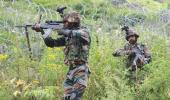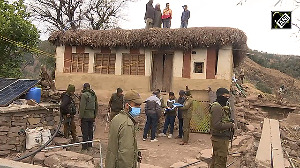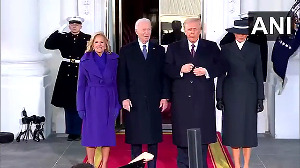De-centralised execution should drive the operational concept and support military strategy, under a unified command architecture.
Enablers and technology need to be positioned first for such an activity to be undertaken, recommends Lieutenant General Anil Chait (retd).

War continues to remain a continuation of politics by other means whatever be its chameleon character.
In today's and future context and in matters involving clash of strategic interests between States it cannot be limited to single service or purely military means.
Militaries must lead, assist and aid other tools of power and not impede/imperil the national effort by limiting themselves to interagency coordination.
Elements of power, therefore must overlap and interconnect more, to deal with the hybrid threats and grey zone warfare, considering democratization of bad and perilous paradox of new technology.
Hence 'Sashakt aur Surakshit' (Strong and Secure) Bharat is the theme of the first ever joint commanders military conference on September 4-5 at Lucknow.
Holding of the conference suggests, that the continuum of appropriate response for a future ready armed force is moving towards jointness to produce desired and calibrated effects, in sync with the threats, for achieving desired politico-military objectives.
This is more relevant on account of merger of peace and war and kinetic/non-kinetic domains besides the envisaged man machine mix, through biological and laboratory grown artificial minds.
Against such a backdrop, a move toward creation of joint/unified forces and theatre commands in the military must necessarily evolve on the curve and trajectory of cooperation, collaboration and on to confluence of forces.
This must be preceded by a vision for Joint Forces which must envisage creation of a 'highly responsive military force for joint force employment for undertaking regionally integrated converged operations, in the continental cum maritime context of the Indian sub-continent, for the entire spectrum of conflict for defending frontiers and advancing of national interests.'

For achieving the above vision, a Joint Operational Concept need to contemplate 'integration of capabilities across domains, environment and functions, in time and space for the organized application of military power in and through extended battle space to achieve the desired purpose.'
Concepts also need to remain aligned to the Indian cultural contexts and Make in India narrative.
Above assumes joint planning and preparation, which needs to be based on deductive joint intelligence estimates.
De-centralised execution should drive the operational concept and support military strategy, under a unified command architecture.
Enablers and technology need to be positioned first for such an activity to be undertaken.
Joint Warfighting in such a construct will have to be pursued through the consolidation of sensors and aggregated physical and technological effectors, for accelerated effect-based ops.
This will require optimization of inter-service and inter-agency coordination by a synergistic interdependent process and throughput.

For such an architecture to be ready against the tenets of integrated warfighting, augmentation of the planning mechanism is a must.
It would be essential for such a planning mechanism to fully accommodate joint and single-service plans, along with the processes and support plans, of other agencies/organisations as well.
Once the tenets stated above are shared and fine-tuned between the stake holders, Theaterisation involving extended battlespaces will require to be commanded and controlled through creation of bi/tri-service theatre specific structure for application of response under the department of military affairs headed by the chief of defence staff.
In this process, ranks and berths for which services have waged the turf battle will become irrelevant against the larger idea of functionality, driven by some cogent and wholesome throughput for winning the 'Nation's War At Least Cost'.
Lieutenant General Anil Chait (retd) served as chief of the Integrated Defence Staff; he was also Central Army Commander.
Feature Presentation: Aslam Hunani/Rediff.com











 © 2025
© 2025